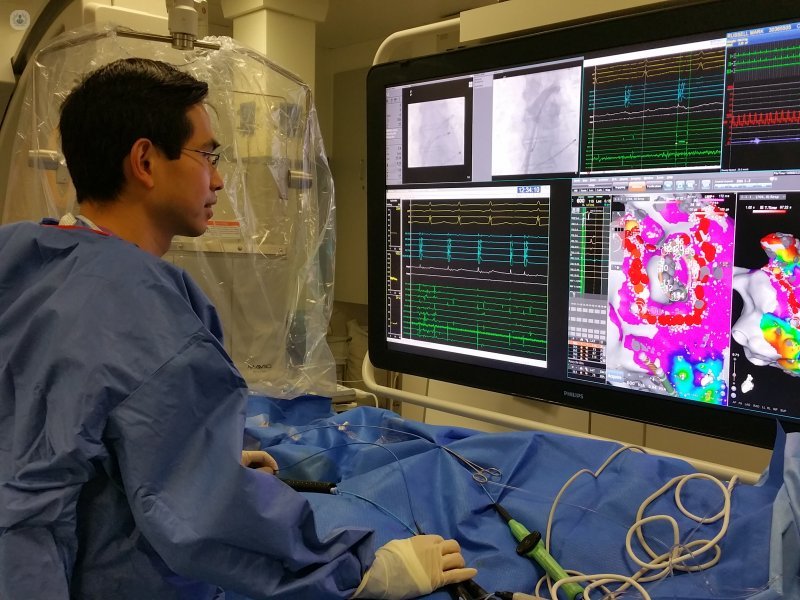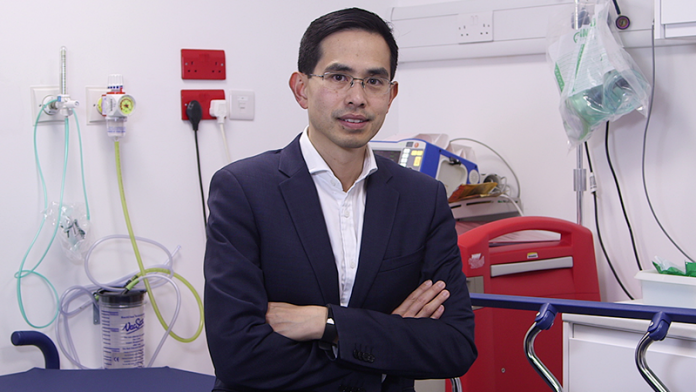At Top Doctors we like to get to know our doctors on a personal level, and we want their patients to get to know them like we do.
What makes someone decide to go down the challenging career path of becoming a doctor, and what is it about their chosen specialty that really interested them?
Renowned London-based consultant cardiologist and electrophysiologist, clinical lead of the Imperial Syncope Diagnostic Unit at Hammersmith Hospital, and multiple Top Doctors Award winner, Dr Boon Lim took some time out of his busy schedule to answer these questions and more, telling us what motivates him each day.
Why did you decide to become a doctor and to specialise as a cardiologist?
I have wanted to be a doctor for as long as I can remember. I have always had the full encouragement of my family to pursue my ambition, particularly as I would be the first doctor in my family.
At first, I actually wanted to be a surgeon, but I was put off that idea when I came to do general surgery. I found cardiology to be really compelling as it involved minor operations on the heart through a keyhole approach, so I took up what I considered to be the most “surgical” specialty within medicine, and became a cardiologist.
You have particular expertise in syncope, what is it that you find interesting about this condition?
The physiology of syncope is still not fully understood, and one of the most exciting things about this condition is the fact that I continue to learn about this subject on a day-to-day basis. I did my PhD at Imperial College London in 2006, learning about the role of the autonomic nervous system in heart rhythm disorders, and since then I have been able to apply some of this knowledge to understand much more about vasovagal syncope.
Furthermore, there is a lot that patients can learn about vasovagal syncope. An empathetic and reassuring approach, focusing on conservative lifestyle measures, can significantly alleviate patients’ symptoms and importantly any psychological fear of this condition.
Being able to connect with patients and instilling education and understanding about this condition, has been one of the most fulfilling career aspects for me. To further the awareness of this condition, and to help facilitate discussion with patients, I developed the Stop Fainting website.
As the clinical lead of one of the top syncope units in London and the UK, the Imperial Syncope Diagnostic Unit based at Hammersmith Hospital, I have been able to develop a strong and dedicated team who are knowledgeable and empathetic, and we continue to pursue research into developing novel strategies to help improve the lives of patients with syncope.

You divide your time between research, teaching, and seeing patients. How do you manage your time, and which part of your work do you enjoy the most?
The question about time management is an interesting one. Rather than considering my day in terms of time, I try to consider the amount of attention and focus that I would like to place on any given task. Of course, the most important factor is to focus on the task at hand and always be in the present moment. I enjoy all aspects of my work and make accommodations for clinical time, teaching time, and research and I enjoy all of these activities.
Recently I came to realise that instead of academic or clinical achievements, the most enjoyable and fulfilling part of my day-to-day work, as well as my home life, is the development of respectful and meaningful relationships with the people that I work with and the patients that I speak to.
However, the best part of the day for me is first thing in the morning and before going to bed, where I dedicate 10 minutes to bookend each day with a gratitude exercise whilst practising mindful breathing.
You recently published the book ‘Keeping Your Heart Healthy’. Why did you decide to write this book, and who is it aimed at?
I decided to write the ‘Keeping Your Heart Healthy’ book for the lay person. It is written in an easy-to-digest format, with bite-size chunks of information that focuses on gaining an understanding into the most common heart conditions and importantly, a strong focus on lifestyle interventions such as self-help strategies that can help to minimise the risk of developing any heart conditions in the future.

This book will also be helpful for patients who have had a cardiac diagnosis, such as hypertension, angina, high cholesterol levels, fainting and the metabolic syndrome.
The most revealing thing to me when writing this book was how the recent rapid development of medical technology and state-of-the-art treatments has led to a small but definite incremental benefit in cardiovascular outcomes.
However, in my opinion, the greatest intervention is the that of self-care, empowered by a firm understanding of cardiovascular conditions, and how to make simple lifestyle changes to improve your cardiovascular risk profile.
Lifestyle changes such as eating healthily and having a healthy response to stress are often completely underestimated and not adequately addressed in cardiology consultations.
‘Keeping your Heart Healthy’ breaks this down and gives simple and practical advice to let all readers know that something as simple as skipping breakfast every day, to develop the time restricted eating habit, can significantly reduce cardiovascular risk.
Of course, this is not for everyone, but those who have a higher BMI, who are struggling with diabetes or prediabetes and early coronary disease, could benefit from this simple intervention.
How do you aim to continue to raise awareness of heart conditions?
I will raise awareness one patient at the time, one family at the time, one lecture at the time: I do believe strongly that through empowering patients and inspiring them to live better through a good understanding of how to make healthy lifestyle choices, we will see those positive behaviours percolate through families and friends, eventually reaching out to a wider and wider audience.
If you hadn’t become a doctor, what do you think you would be doing now?
Physics and mathematics were my favourite subjects at school, and I have always enjoyed looking up at the sky in awe and wonder at the stars. Because of this, I suspect I would have enjoyed astronomy, and part of the appeal is understanding how incredibly amazing it is for us to be on this Earth at this present time as sentient beings with consciousness, despite the infinitesimal chances of this occurring.
……or I would be playing guitar in a band (though I need a lot more practice!)
To purchase Dr Lim’s Penguin Life Expert Book, “Keeping Your Heart Healthy”, click on this link: https://amzn.to/2WK0vW2
Excerpt from the book from “Chapter 9 – A better balance between stress and rest”
Five top tips for creating a better balance
Establishing a better psychological and emotional balance in life is vital to physical health and well- being. Making the change now, starting with just three minutes of breathing, will improve your heart and your health, immediately.
1. Create a daily routine: Routines are powerful tools for improvement, as they enable you to create a habit out of stress reduction. You can set a routine including any number of intentions: for example, to do your wake-up gratitude, breathing and goal-setting exercises; to leave for a destination ten minutes earlier than you need, so that you can walk an extra block or stop on your way; to remove all mobile devices from the dining table during a family meal; to turn off your work devices at a set time in the day to enable you to focus on your family, your personal hobbies, your health and yourself; or to wind down one hour before bedtime – no exceptions.
2. Slow your breath: Spend time breathing slowly more often during the day. Breathe in this way when you wake up, when you notice you’re getting stressed or emotional, when you’re getting ready for bed and whenever you find you’ve got a free minute or two. You may also find longer breathing meditations, like the ones in yoga or mindfulness meditation, to be helpful.
3. Observe more: Spend time paying more attention to the present moment – the wind on your skin, the colour of the sky, the sense of sitting grounded in your chair, the emotions that rush over you when you think of a cherished loved one (or a deadline), the rate of your breathing and heartbeat. Mindfulness exercises are designed to help train your mind to focus more on the present versus the past and the future, reducing the impact of chronic stress. But it’s also good for your a better balance between stress and rest keeping your heart healthy health (and lowers stress levels) to observe what you have to be grateful for – and to relish those positive feelings every day.
4. Exercise more: Being physically active is a great stress reliever. It helps by putting the adrenaline released by the sympathetic nervous system to work for the purpose that nature intended – moving your limbs and getting your heart pumping, with a short burst of healthy physical activity. HIIT workouts are great for this, training your body to quickly shift out of fight-or-flight mode – something that also happens when you cap your workout with a shower in the Wim Hof way, with a shock of cold water.
5. Get a good night’s sleep. There are so many ways in which sleep, stress and immune function are interrelated that it’s essential to make seven to nine hours’ sleep a night a goal for everybody.








Join the discussion